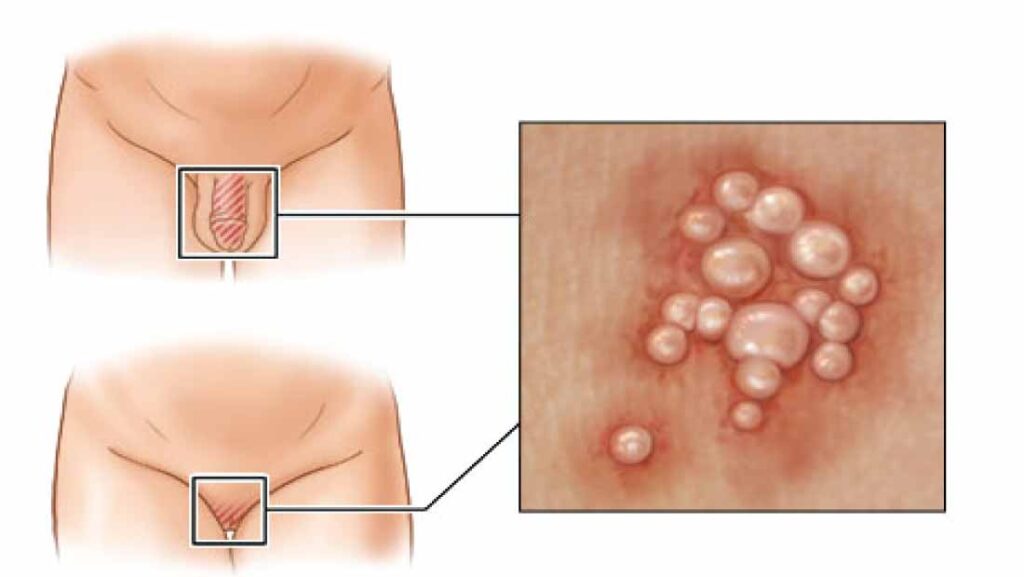Genital herpes: symptoms and treatment
Genital herpes is on the list of one of the most common sexually transmitted diseases according to statistics from the World Health Organization (WHO), who estimate that there are millions of people living with this disease. This STD is caused by the herpes simplex virus and is spread by having sex with someone who is infected. Here I tell you everything you need to know about the infection, symptoms and treatment.
What is genital herpes?
Caused by two types of herpes simplex virus, (HSV-1) commonly known to be the cause of “cold sores” or sores that cause discomfort in the mouth, and (HSV-2) that is spread only through sexual intercourse, although type 1 can also be transmitted through oral sex. Genital herpes is a sexually transmitted disease that affects the normal life of many people in the world when they are infected, mainly because of the discomfort or symptoms that appear.
With the appearance of genital herpes begins a cycle of infection that originates in the affected area sores, pain and itching, this when the virus remains active in the body, since, genital herpes has no total cure. Outbreaks are very common during the first years of infection, although it should be clarified that many people may be infected and not have any visible symptoms.
How is genital herpes spread?
Genital herpes is transmitted mainly through sexual intercourse, whether vaginal, oral or, it is enough to be in direct contact with saliva, herpes sore or genital discharge of the person carrying the infection. Remember that the infection will not necessarily be visible, because there are cases where the infected is not aware of their condition.
In the case of herpes type 1 or oral herpes, it can be spread if you have skin-to-skin contact with the infection even if it is not visible to the naked eye. When can you not get genital herpes? STDs will not affect you in normal situations such as sitting on a toilet, swimming in a pool, using a towel or soap.
Symptoms
Although it seems unpossible about STDs, it is that many can go unnoticed by those infected and people close to them. Simple, genital herpes infection in some cases has no symptoms or are very mild.
It is known that the genital herpes virus has an incubation period like most other viruses, therefore, from the moment the person is infected through sexual intercourse it can take two days, up to a week to manifest general malaise, fever and pain or itching in the intimate area.
When at its most active, men may feel specific discomfort in the buttocks, thighs, anus, mouth, penis, scrotum and urethra. While in the case of women the infection also attacks the vaginal area, mouth, buttocks and cervix.
In general, the most common symptoms of genital herpes are:
- Pain, itching that produces sensitivity in the area.
- White blisters or red bumps
- Ulcers as a result of blisters that rupture, this generates pain when urinating.
- Crusting when ulcers begin to heal
It is important to note that getting genital herpes has consequences, especially what is an STD that will always be in your body, so, after overcoming the first stage of infection or also called the first year, the symptoms usually disappear or be milder with each regrowth.
Likewise, the person infected with the genital herpes virus may be more likely to contract other sexually transmitted diseases if they do not take the necessary care in their relationships.
Risk factors
Genital herpes is a sexually transmitted disease that, although it has no definitive cure, if it can be kept low profile, even with precautions it can decrease the intensity or duration of regrowths.
But, there are risk factors to consider, such as that women are usually more likely to suffer a contagion or that people with multiple sexual partners are twice as exposed to this disease.
On the other hand, pregnant women who are carriers of the virus, should be careful and notify their doctor, since, if at the time of delivery the virus is active it could infect the newborn putting its health at risk.
Genital herpes treatment
Genital herpes should be treated immediately after its discovery, it is the specialist who through a check-up must determine if you suffer from the disease. If the virus is in its active stage, it will only be enough to check for sores or ulcers, but if, on the contrary, there are no visible symptoms with a blood test, STDs can be diagnosed.
To appease the symptoms of genital herpes, treatment should be based on oral antivirals, both for the affected person and for the sexual partner of the same if he maintains a monogamous relationship.
In the case of pregnant women who have the active virus in pregnancy, treatment should be carried out before delivery to prevent possible complications or transmission of the baby.
Maintaining good hygiene of the intimate area, also keeping it dry in case of sores or the use of condoms, are simple actions that the affected person can do to reduce the impact of the virus on their daily lives. In addition, during the first stage of infection analgesics will be of great help to relieve general discomfort.


